
Glenda May Jackson is an English actress and politician. She has won the Academy Award for Best Actress twice, receiving the first for her role as Gudrun Brangwen in the romantic drama film Women in Love (1970) and the second for her role as Vickie Allessio in the romantic comedy film A Touch of Class (1973). She also received praise for her performances as Alex Greville in the drama film Sunday Bloody Sunday (1971) and Elizabeth I in the BBC television serial Elizabeth R (1971), winning two Primetime Emmy Awards for the latter. In 2018, she won the Tony Award for Best Actress in a Play for her role in a revival of Edward Albee's Three Tall Women, thus becoming one of the few performers to have achieved the "Triple Crown of Acting" in the US.
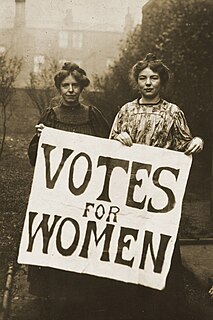
The Women's Social and Political Union (WSPU) was a women-only political movement and leading militant organisation campaigning for women's suffrage in the United Kingdom from 1903 to 1918. Known from 1906 as the suffragettes, its membership and policies were tightly controlled by Emmeline Pankhurst and her daughters Christabel and Sylvia.

The Rivals is a comedy of manners by Richard Brinsley Sheridan in five acts which was first performed at Covent Garden Theatre on 17 January 1775. The story has been updated in numerous adaptions, including a 1935 musical in London and a 1958 episode of the television series Maverick starring James Garner and Roger Moore, with attribution.

Indecent Proposal is a 1993 American drama film based on the novel of the same name by Jack Engelhard, in which a married couple's relationship is put into turmoil by a stranger's offer of a million dollars for the wife to spend the night with him. It was directed by Adrian Lyne and stars Robert Redford, Demi Moore, and Woody Harrelson. The film was a box-office success, despite earning mostly negative reviews from critics, grossing nearly $267 million worldwide on a $38 million budget.

Patricia Stephanie Cole is an English stage, television, radio and film actress, known for high-profile roles in shows such as Tenko (1981–1985), Open All Hours (1982–1985), A Bit of a Do (1989), Waiting for God (1990–1994), Keeping Mum (1997–1998), Doc Martin (2004–2009), Cabin Pressure (2008–2014), Still Open All Hours (2013–present), Man Down (2014–2017) and as Sylvia Goodwin in ITV soap opera Coronation Street (2011–2013).
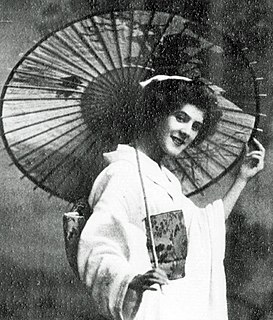
Dame Esmerelda Cicely Courtneidge, was an Australian-born British actress, comedian and singer. The daughter of the producer and playwright Robert Courtneidge, she was appearing in his productions in the West End by the age of 16, and was quickly promoted from minor to major roles in his Edwardian musical comedies.

Cicely Mary Hamilton, was an English actress, writer, journalist, suffragist and feminist, part of the struggle for women's suffrage in the United Kingdom. She is now best known for the feminist play How the Vote was Won, which sees a male anti-suffragist change his mind when the women in his life go on strike. She is also credited as author of one of the most frequently performed suffrage plays, A Pageant of Great Women (1909), which featured the character of Jane Austen as one of its "Learned Women."

Gaiety Girls were the chorus girls in Edwardian musical comedies, beginning in the 1890s at the Gaiety Theatre, London, in the shows produced by George Edwardes. The popularity of this genre of musical theatre depended, in part, on the beautiful dancing corps of "Gaiety Girls" appearing onstage in bathing attire and in the latest fashions. The 1890s Gaiety Girls were respectable, elegant young ladies, unlike the actresses from London's earlier musical burlesques. Later, even the stars of these musical comedies were referred to as Gaiety Girls.
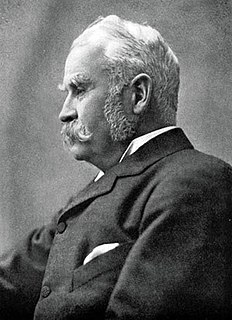
The Fortune Hunter is a drama in three acts by W. S. Gilbert. The piece concerns an heiress who loses her fortune. Her shallow husband sues to annul the marriage, leaving her pregnant and taking up with a wealthy former lover. The piece was produced on tour in Britain in 1897, never playing in London.
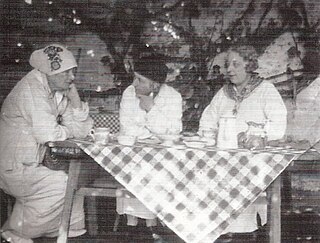
Christabel Gertrude Marshall was a British campaigner for women's suffrage, a playwright and author. Marshall lived in a ménage à trois with the artist Clare Atwood and the actress, theatre director, producer and costume designer Edith Craig from 1916 until Craig's death in 1947.
Rosemary Frances Rees was a New Zealand actress, playwright, theatre producer and novelist. She worked in New Zealand, Australia and England. After her career in theatre she became a romantic novelist.

Cicely Margaret Escott, also known as Peg Escott, was a New Zealand novelist, playwright, poet and drama teacher. She was best-known for her novel Show Down, published in 1936. The United States edition was titled I Told My Love. A second edition was published in New Zealand in 1973. In later life she worked in theatre, and wrote a final volume of poems shortly before her death.
Suffrage drama is a form of dramatic literature that emerged during the British women's suffrage movement in the early twentieth century. Suffrage performances lasted approximately from 1907-1914. Many suffrage plays called for a predominant or all female cast. Suffrage plays served to reveal issues behind the suffrage movement. These plays also revealed many of the double standards that women faced on a daily basis. Suffrage theatre was a form of realist theatre, which was influenced by the plays of Henrik Ibsen. Suffrage theatre combined familiar everyday situations with relatable characters on the stage in the style of realist theatre.
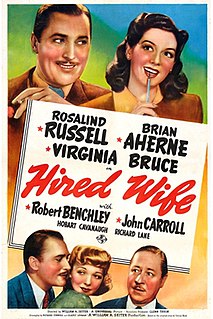
Hired Wife is a 1940 American romantic comedy film directed by William A. Seiter and starring Rosalind Russell, Brian Aherne and Virginia Bruce.
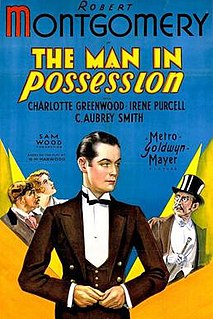
The Man in Possession is a 1931 American pre-Code romantic comedy film starring Robert Montgomery, Charlotte Greenwood, Irene Purcell, and C. Aubrey Smith, based on the play of the same name by H. M. Harwood. The black sheep of a family finds himself falling in love with the wealthy woman his brother is seeking to marry.

The Actresses' Franchise League was a women's suffrage organisation, mainly active in England.

Doris Lytton was an English actress on stage and in silent films, and a businesswoman in the 1920s. Later, as Doris Lytton Toye, she wrote a cookbook tailored for post-war shortages, Contemporary Cookery (1947).
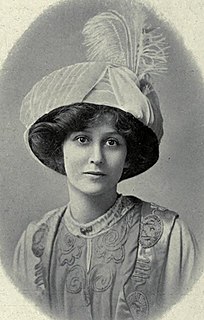
Christine Silver was a British stage, film and television actress, and a playwright.

Helen Rous was a versatile Irish actor who played many times on the London stage. Her parts included supporting roles in works by Oscar Wilde and George Bernard Shaw.
Lynn Milgrim is an American film, television, and stage actress. She was born in Philadelphia, Pennsylvania. She is best known as an accomplished stage actress and has been in numerous Broadway, national, and regional productions. She has also appeared in many feature films, television series, and television movies.